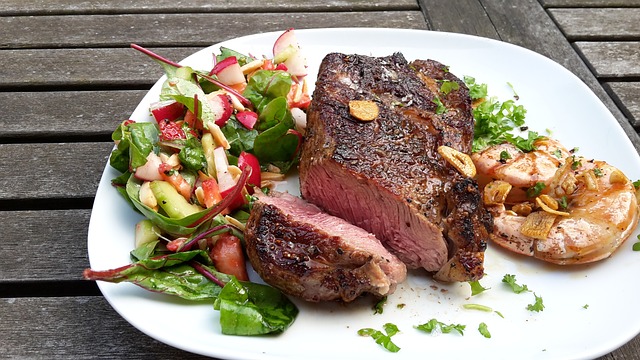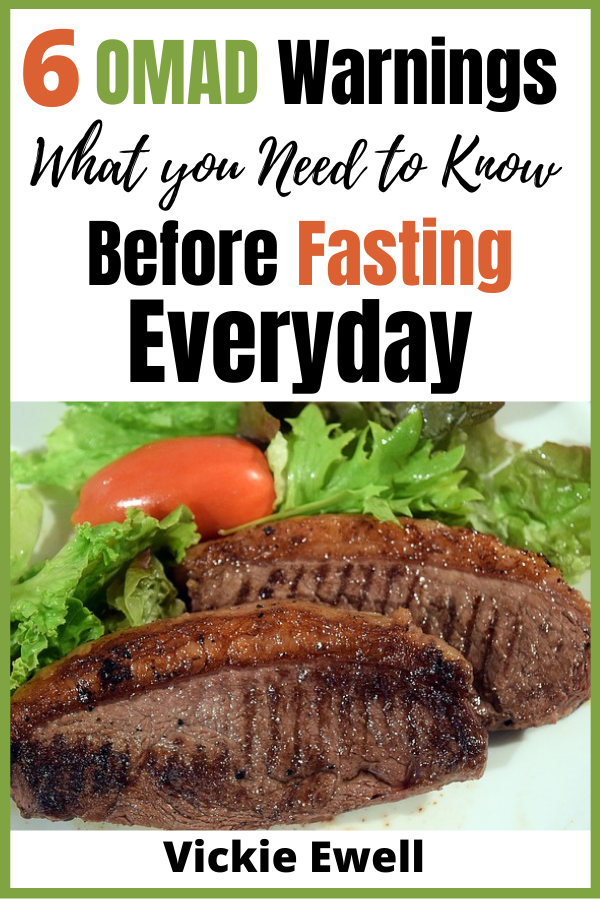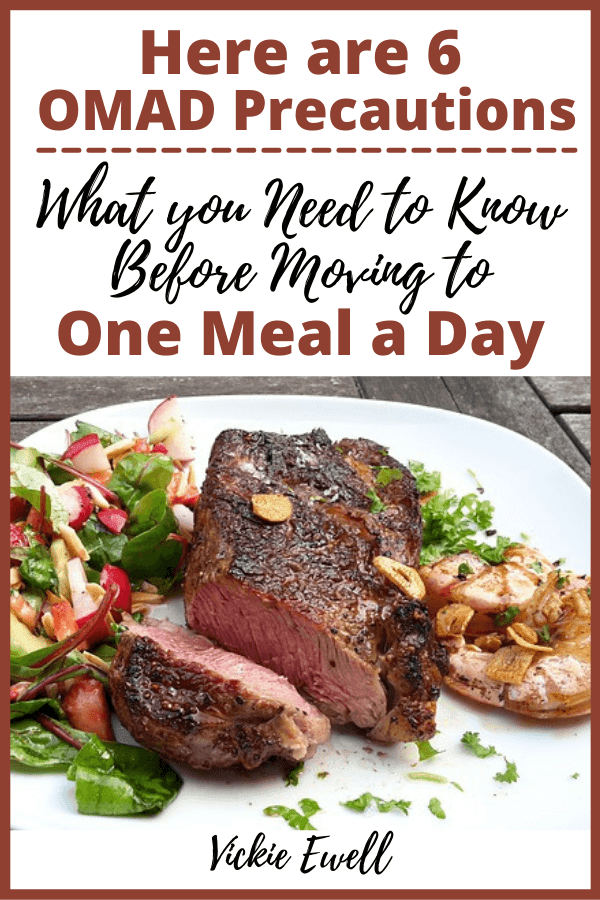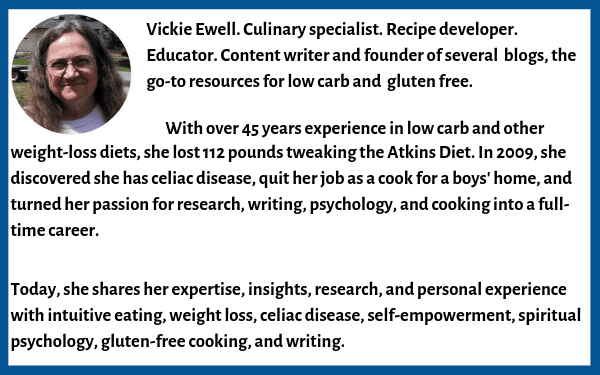The practice of eating only one meal a day (OMAD Diet) is quickly gaining popularity within the low-carb community.
While the OMAD Diet doesn't require you to restrict your carbohydrate intake, many people are combining Keto with OMAD and seeing results.
So why am I upset?I'm seeing a huge number of OMAD dieters recommending that newbies to carbohydrate restriction start off by eating only one ketogenic meal a day.
They are calling this Intermittent Fasting and using the Keto umbrella to make it all sound legit. Like one meal a day and Keto are the same thing.
There's no cautions or warnings given to newbies.
There's just a lot of persuasion going on, trying to talk those new to the low-carb cause into joining the OMAD club.
From my perspective, dropping from 3 meals a day, plus snacks, down to just one ketogenic meal per day isn't always safe.
And here's why:
Warning #1: Protein Deficiency
Your daily protein needs are not a percentage of the number of calories you consume. The body needs an absolute number of amino acids to make physical repairs, build new body structures, and create hormones, enzymes, antibodies, and other stuff.
For most people doing Keto, this means you need around 72 to 90 grams of protein, or more.
On the average, this works out to be about 12 to 16 ounces of high-quality protein sources per day:
- eggs
- meat, poultry, fish
- hard cheeses
- cottage cheese
- protein powder
- yogurt
You need 12 to 16 ounces of protein no matter how many times you eat throughout the day. For reference, that's about 1 pound of lean ground beef or 3 to 4 chicken leg quarters.
If you don't eat enough protein at your single meal, you'll probably begin to experience the symptoms of starvation mode. Starvation causes your stress hormones to go up, metabolism to slow down, and protein deficiency symptoms, such as:
- hair discoloration
- slow-growing nails
- joint pain
- neck pain
- headaches
- insomnia
- wounds slow to heal
- water retention
- bloated belly
- dry skin
- skin rashes
- unstable blood glucose
- exhaustion
- heart problems
While some people report less sluggishness in the afternoon due to no lunch or snacks, dinner has to be quite large in order to fulfill your daily nutritional needs.
Lean proteins carry a higher amino acid profile than fatty meats, so this isn't impossible to do, but you do have to pay attention to what you're eating and how much.
Eating a lot of fatty meat will make your protein aim much harder to hit. You'll need more than a pound of meat, cheese, and eggs if the meat is super high in fat. An ounce of meat, cheese, or an egg will net you about 6 to 7 grams of protein, so eggs, cheese, and protein powders can be of value here.
A lack of protein will also encourage your body to burn muscle, which means you'll lose strength as well as trigger hunger.
Tearing down old, warn-out protein structures can be beneficial to the body, which is why this fasting thing has caught fire within the low-carb community. But, once those old structures are torn down and repaired, the body will have no choice but to get its amino acid needs from healthy muscle tissue if you aren't eating enough.
This is why fasting is beneficial when done occasionally and not every single day.
Warning #2 Carbohydrate Tolerance
Many people who choose to go Keto, rather than another low-carb approach, have some level of insulin resistance, so anything that helps to lower your basal insulin level will be of value.
Eating only one meal a day will certainly cause your insulin level to drop quite dramatically and stay down for an extended amount of time during fasting hours.
Low insulin makes it easier for the body to mobilize its fat stores.
However, your body will only be able to deal with a certain amount of carbohydrate when those carbs are all eaten at one time. Where you might be able to eat 40 carbs per day when spread out over 2 or 3 meals, eating only dinner might mean that you'll need to keep your carbs down below 20.
This isn't a nutritional problem since there's no direct need for any carbohydrate in the diet, but you do need to find the right amount of carbs that you can eat at a single meal that won't cause your blood glucose to get out of whack.
The body stores enough insulin to handle the amount of carbs you ate at your prior meal. Not what you're currently eating. So it will take awhile for the body to catch on to your new pattern of eating.
When that happens, hunger soars and cravings for sugar become rampant. It's best to dial back on the carbs until everything settles down. The fewer carbs you eat, the less hunger and cravings you'll have. And the more protein you'll need to eat to stay satisfied.
While the Atkins Diet in 2020 recommended a 2-cup salad and a cup of cooked vegetables per day, when new to the low-carb way of life, hunger is a more useful guide for how many carbs you should actually eat on OMAD.
Warning #3 Indigestion and Bloating
For just one meal a day, we're talking about a lot of food. Bulky food. Twelve to 16 ounces of protein, a hefty 2-cup salad, a cup of cooked vegetables, and other low-carb extras all at one time.
While you might see an upswing in energy during the afternoon, you're likely to be lethargic throughout the evening if you actually eat all of the food you need in a single meal. In addition, digestion is going to take much longer than it otherwise would.
Use Thanksgiving as a measuring tool.
Do you feel sleepy and tired after a big Thanksgiving Dinner? That's how you're likely to feel on OMAD.
Warning #4 Electrolytes and Water
When you drop your carb intake to less than 20 grams a day, your kidneys begin to dump a lot of sodium. Along with that sodium, other electrolytes like magnesium, calcium, and potassium also get dumped.
This means your electrolytes requirement doesn't go down just because you're only eating once a day. You need to continue getting enough minerals in your diet. You'll also need to continue drinking at least one-half of your body weight in ounces of water.
Otherwise, you're going to get what's called the Atkins or Keto Flu.
It's not really a flu virus. It's unbalanced electrolytes, which is cured by upping your intake of sodium, magnesium, calcium, and potassium.
Warning #5 Body Will Adapt to your Calorie Intake
You have to have a calorie deficit to ditch the body fat. However, when eating only once a day, day after day, the real problem isn't being in a calorie deficit. The real problem is eating too few calories.
Calorie intake is adapted to by the body, so if you start your weight-loss journey eating very little food, the body is going to adapt to that amount, and you'll have no where to go when your weight-loss stalls.
You're already eating only once a day.
You're already fasting every day, so what's left?
This is the biggest reason why newbies should stay away from OMAD approaches until you've exhausted all of the other low-carb options. The body is going to adapt to the number of calories you're eating, and when it does, your weight loss will stop.
Generally at this point, you would look over your diet and toss out a few things you can live without, but that's not going to work with OMAD.
Eating less than OMAD is going to be dangerous.
Warning #6 Likely to Binge
When Intermittent Fasting (2 meals a day within a time-restriction eating window) first came out, it was a way to move from calorie adaption to something less.
Skip breakfast, other than coffee or tea, and restrict your eating to lunch and dinner. Many people were able to break through a lengthy stall by eating that way.
It naturally lowered their calorie intake without having to count calories.
A few moved to Intermittent Fasting because they were not hungry in the morning. The body didn't want to eat first thing. There was no stress on the body; and no hunger from giving up breakfast.
The move was natural and well tolerated.
People started losing weight again.
Problems came when these same people decided that since using Intermittent Fasting worked well for them to break a stall, that others, including newbies, should be eating this way too.
If you're new to low carb, that doesn't make sense.
The hunger you experience from not eating during all of those hours is going to win. Going all day long without eating is going to rev up your hunger and make it harder to stay true to the program.
While it might free up a lot of time in the kitchen for those who aren't passionate about cooking, doing OMAD deliberately, rather than naturally, is going to come with consequences.
Those with a tendency to binge are going to binge.
Self-discipline is something that most overweight people have to develop as their weight-loss plan progresses toward their goals. Most people don't have the strength to ignore their body's hunger signals.
Eventually, you're going to give into those cravings and eat more than you would if you were still eating 3 times a day, plus snacks.
Final Thoughts
It's much better to start off your low-carb lifestyle with a simple low-carb diet and let your hunger guide your carbohydrate consumption than it is to follow the crowd.
Eliminate snacks if you want to drop your calorie intake. That's much less stressful on the body than going from 3 meals and 2 snacks to just one meal a day.
Regular low-carb diets can be designed to be simple, too.
I lost almost 40 pounds in 2020 just keeping things simple. I cut my protein breakfast in half. Some days I skipped lunch and some days I did not. I let my hunger be my guide.
Lunch was usually just more protein.
I then made a traditional low-carb dinner for both hubby and I.
We also ate dessert: Carbsmart Ice Cream
I'm no longer doing that since I started reacting badly to sugar alcohols, including erythritol and allulose. Liquid Splenda tastes bitter, so I'm not using that much either. I've been on maintenance to help me get through the holidays.
But now, it's time to get back to work.
We also ate dessert: Carbsmart Ice Cream
I'm no longer doing that since I started reacting badly to sugar alcohols, including erythritol and allulose. Liquid Splenda tastes bitter, so I'm not using that much either. I've been on maintenance to help me get through the holidays.
But now, it's time to get back to work.





Comments
Post a Comment